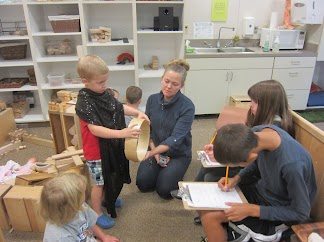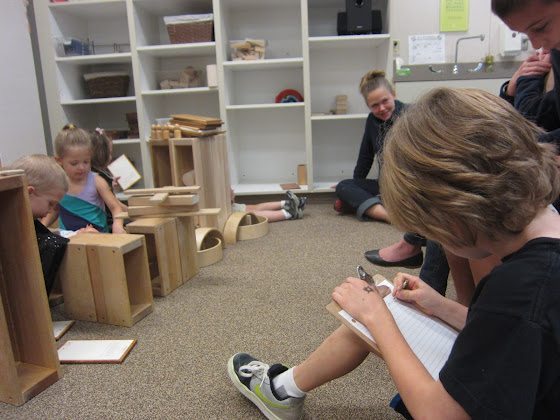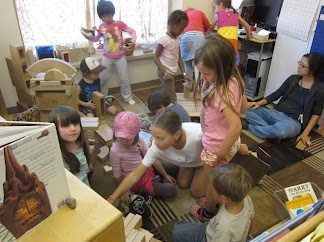Authentic Inquiry and real life challenges

“What kind of blocks does each classroom need?”
“What is the space like where they will store their blocks?”
“How are the pre-schoolers using the blocks?”
These were questions asked by the group of students charged with researching the four Opal classrooms which had asked us to build them hollow blocks. While the majority of our class was focused on making observations about the blocks themselves and asking questions about the physical requirements of block construction, a small group of kids set off to do research in the Pre-k, Early K, Opal 1 and Opal 2 classrooms. After a day of preparation (letter writing, developing research questions, discussing how best to observe and take notes and classroom etiquette as researchers) four groups were set to head off to visit with the younger students. Their seriousness and excitement about their task was evident. “Remember Rob, we have to be up in the Pre-K at 9:00 tomorrow morning.”
While the beginning of the school year can be chaotic in many ways (new routines take time to establish, new expectations are not always easy to live up to, the open ended nature of summer schedules give way to a more structured school life) I had little trepidation about sending these kids into an unknown situation, even though they had displayed some difficulty focusing while in class. I knew the task at hand held them to a high standard. They carried their assignment with pride and demonstrated tremendous responsibility.
“Your group did great”
“They really were engaged with the young ones, asking great questions.”
“They really wanted to help. They even offered to build a moving cart”.
The feedback that I received from several teachers spoke volumes about how these small groups handled themselves.
Authentic inquiry and real world challenges, by their very nature, engender a seriousness and responsibility, and a strong image of children supports us to structure these opportunities as the heart of their work. What happens when this kind of work becomes and remains the mainstay of children’s learning? Does this kind of work create its own rules and sense of order? Does the seriousness of the questions and the community connections generate focus and a genuine sense of responsibility? What is the order that children create for themselves that is not contingent on adults “teaching” them? At Opal School, the adults wonder together: What is the difference between being in charge and being in control?
These questions are at the forefront of my mind as we move into the year and the types of projects we may discover and engage in give way to opportunities for greater levels of responsibility and therefore, engagement.
Interviewing pre-K students about their use of a variety of hollow blocks.

Taking observational notes on how the younger students play with the blocks.

Playing with the Opal 1 kids and figuring out how many blocks filled one of the shelves.

Project based learning is complicated and can be frustrating because the children themselves are determining, designing, and resolving the problems. As one of the students said, “That’s why it’s called a challenge!” Watching Opal 3 students today as they attempted to make exact replicas of blocks, it’s clear that it’s worth the effort. As I type, I’m serenaded by the sounds of power scissors and engaged learners. Let the music play!